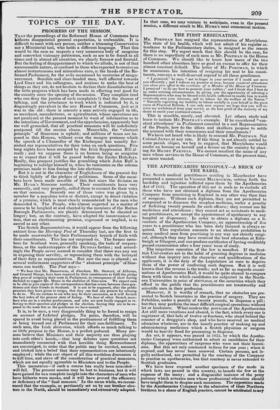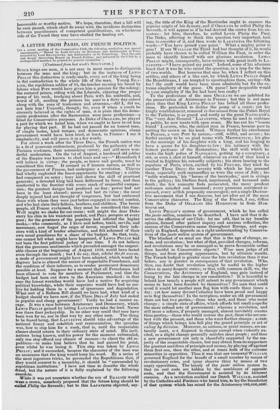THE APOTHECARIES' MONOPOLY—A BRICK OF THE BABEL. THE Scotch medical
practitioners residing in Manchester have presented a memorial to Viscount MELBOURNE, setting forth the hardship and injustice inflicted upon them by the Apothecaries Act of 1815. The operation of this act is such as to exclude all those who have not obtained a diploma from the Apothecaries Company from practising in England in any other way than that of surgeons. 'Without such diploma, they are not permitted to compound or to dispense the simplest medicine, under a penalty of forfeiting twenty pounds for each offence; they cannot sue for medicines and attendance ; they cannot act as assistants to medical practitioners, or accept the appointment of apothecary to any hospital or dispensary. In order to obtain a diploma as a licentiate of the Apothecaries Company, an apprenticeship of five years to a practitioner who has been duly licensed is always required. This regulation amounts to an absolute prohibition to many medical men from practising in any way not strictly surgical, although they may have received the best education at Edinburgh or Glasgow, and can produce certificates of having creditably passed examination after a four years' term of study. The iniquitous operation of the law is manifest. If the Scot tish Universities are in the habit of granting degrees in medicine without due inquiry into the character and qualifications of the applicants, it is the duty of the Legislature at once to deprive them of the power of conferring such degrees. But it is well known that the reverse is the truth ; and as far as regards examinations at Apothecaries Hall, it would be quite absurd to compare them with those to which candidates are subjected in the Northern Universities in point of strictness, or the securities which they afford to the public that the practitioners are trustworthy and scientific men in their profession.
Moreover, it is worthy of remark, that no obstacles are pre sented to Scotch licentiates in the practice of surgery. They are forbidden, under a penalty of twenty pounds, to dispense a pill ; but they may perform the most difficult surgical operations without let or hindrance. What renders the provision of the Apothecaries Act still more vexatious and absurd, is the fact, which every one is cognizant of, that lads of twelve or fourteen, who stand behind the counter of a druggist's shop, and who have received no medical education whatever, are in the hourly practice of making up and administering medicines which a Scotch physician or surgeon would be heavily fined for presuming to dispense.
An act, it appears, was passed in 1825, by which the Apothe caries Company were authorized to admit as candidates for their diploma, the apprentices of surgeons who were not their licentiates. But this act only continued in force for one year ; when it expired, and has never been renewed. Certain persons, not legally authorized, are permitted by the courtesy of the Company to practise as apothecaries, but that courtesy is never extended to Scottish graduates.
We have here exposed another specimen of the mode in which laws are passed in this country, to benefit the few at the expense of the many; . and a disgraceful instance of the petty jealousy which actuates men whose professional education should have taught them to despise such meanness. The opposition made by the Apothecaries Company to the admission of their Northern brethren to a share of English practice, cannot be attributed teeny lumourable or worthy motive. We hope, therefore, that a bill will be soon passed, which shall do away with the invidious distinction between practitioners of competent qualifications, on whichever side of the Tweed they may have studied the healing art.



















 Previous page
Previous page